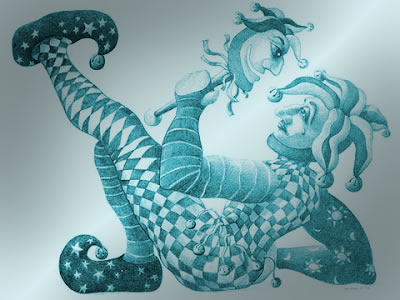Humor is one of the biggest things in my life. Let me tell you why. For one thing, I find that mockery is about the only defense I have against the constant barrage of maddening stupidity and irritating nonsense that I cannot really shut out. Sure, the miracle of the mute button is a real help, a valuable weapon in the arsenal. But often the commercials are upon me before I know it, and my reaction is to hurl blistering rejoinders at the screen. “Just doing my job,†I reassure my family. Of course I could just turn off the damn TV set, but I guess I feel compelled to watch the news to chart the rapid decay of our society and of our once-great position in the world. And I do find some few fiction programs entertaining enough to follow. Naturally, comedy ranks high among them.
My favorites include, of course, Monty Python movies and what I regard as the Golden Age of Saturday Night Live, the seasons featuring Phil Hartman, Chris Farley, Nora Dunn, Julia Sweeny, Jan Hooks, Dana Carvey, etc. King of the Hill continues, even in syndication, to amaze me with its deft balancing of sentiment and wisdom on the one hand with scathing satire on the other. Seinfeld remains a favorite for its freak show depictions of exaggerated character types and its Möebius strip plotting. I wouldn’t have imagined anyone could have upped the ante on cringe-inducing behavior beyond George Costanza and Peggy Hill, but The Office managed to do it on a weekly basis. Two of the absolutely funniest things I have ever seen were mere moments, only a second or two in length, and both on The Tonight Show. On Johnny Carson’s next to last show, Robin Williams (whose movies I would pay not to have to watch) did this missed-it-if-you-blinked bit depicting the scarecrow Mahatma grooving to the surfing music in a hypothetical Gandhi Goes Hawaiian movie, while some years later Jay Leno had Any Serkis on, and he used his Gollum voice to sing a few bars of “You’re the One that I want†(“I’ve got chills, they’re multiplyin’â€). And I savor inspired moments of exquisite absurdity like that Odd Couple episode where Speed reads Scrooge’s lines like an auctioneer. It can be either silly or profound; it doesn’t make any difference.
I think humor is about the highest faculty of human beings. It is a special attainment of transcendence, providing an almost out-of-body perspective on our own thoughts, beliefs, and behavior. To be able to laugh at the irony of one’s own suffering, to be able to poke fun at one’s own folly as easily as you might laugh at the folly of others—that is a godlike trait! Paul Tillich crystallized what should have been obvious: he said we can tell if we have degraded the Sacred to the status of an idol the moment we can brook no criticism of what we hold dear. He called the courage to subject one’s own faith and its object to searching scrutiny “the Protestant Principle.†And the same goes for humor, making fun of what is sacred to us. There is nothing particularly funny about the truly Sublime, but we need to remain alert to the ironies and even stupidities of our representations of our Ultimate Concern so that we will not be tempted to elevate our representations to the status of the Real Thing. I love the Bible, for example, which is why I feel free to make fun of it. I am having fun with what I so love. If I “believed†in it as I used to as a kid, I should be making an idol of it, which is exactly what I used to do. Lucky for me, I have put away childish things. (At least those childish things. You’re going to have to pry my comic books and action figures out of my cold, dead, fingers.)
Because of what Tillich said about the needful role of criticism in warding off the danger of idolatry, I have long believed that satire is the true prophecy. Some of the most effective prophetic criticism in the Bible (I am thinking of the Second Isaiah’s lampooning of idol-makers and Acts’ send-up of faithful prayer that does not even entertain the possibility that it will actually be answered) is outright comedy, and with a pretty sharp edge to it. When a critique of something, anything, makes us laugh, we are caught red-handed, forced to admit the clay-feet fallibility of what has been satirized. Don’t bother spinning some defense of the government’s policy that you’ve favored, not once you’ve laughed at Jay Leno making fun of it. Your laughing has already betrayed what you really believe on the subject. Too late to back pedal now.
Even as an atheist, I seem always to default to the Bible. Remember the story where the king of Israel calls in his yes-men prophets to give their (“God’sâ€) blessing on the military venture he wants to embark on? His ally, the king of Judah, is suspicious. He knows good and well these pocket prophets know where their matzoh is buttered and are scared to disagree with the king. So he tactfully asks if there is someone with a tad more objectivity they can consult. Grudgingly, his royal colleague summons the wise ass prophet Micaiah ben Imlah, who mocks the king, telling him to go ahead, all systems go! Then he tells the king that his pet prophets have all been beguiled by God, who has sent a “lying spirit†to give him a bum steer. The king does not like this message and blames the messenger.
and well these pocket prophets know where their matzoh is buttered and are scared to disagree with the king. So he tactfully asks if there is someone with a tad more objectivity they can consult. Grudgingly, his royal colleague summons the wise ass prophet Micaiah ben Imlah, who mocks the king, telling him to go ahead, all systems go! Then he tells the king that his pet prophets have all been beguiled by God, who has sent a “lying spirit†to give him a bum steer. The king does not like this message and blames the messenger.
Medieval kings were smarter in this regard. They understood that, if they really wanted a fresh perspective, they had to make sure that the voice knew it was safe. At least this was the case with the court jester. He could feel free to say what he thought, taking some of the sting of criticism out of it by adding “Just kidding, your majesty!†Like comedians invited to roast the President at Correspondents Dinners. If the king (or president) didn’t like what he heard, he couldn’t do much about it because it would make him look like a poor sport in the eyes of his guests, just like Herod Antipas in Mark 6:26, who couldn’t back down from what his guests had heard him say. The jester, in our day the stand-up comic, is the true prophet.
But there is still an element of risk attached. Remember Norm MacDonald who some years ago did the Weekend Update segment on SNL? I loved thus guy. He got the audience, not to laugh, but to gasp at his jokes, they were so brutal and so biting (and so deserved!). Until one day when a friend of O.J. Simpson, one of Norm’s favorite targets, pulled some strings and got MacDonald kicked off. “O Jerusalem, you who stone the prophets sent to you!â€
If human beings possess one quality as precious and as advanced as the faculty to see the humor in things, I suppose it might be the ability to take a joke aimed at oneself and welcome the element of truth in it, because most of the time we seem to regard ourselves as holy idols beyond all criticism.
So says Zarathustra.


3 Responses to Humor and the Human